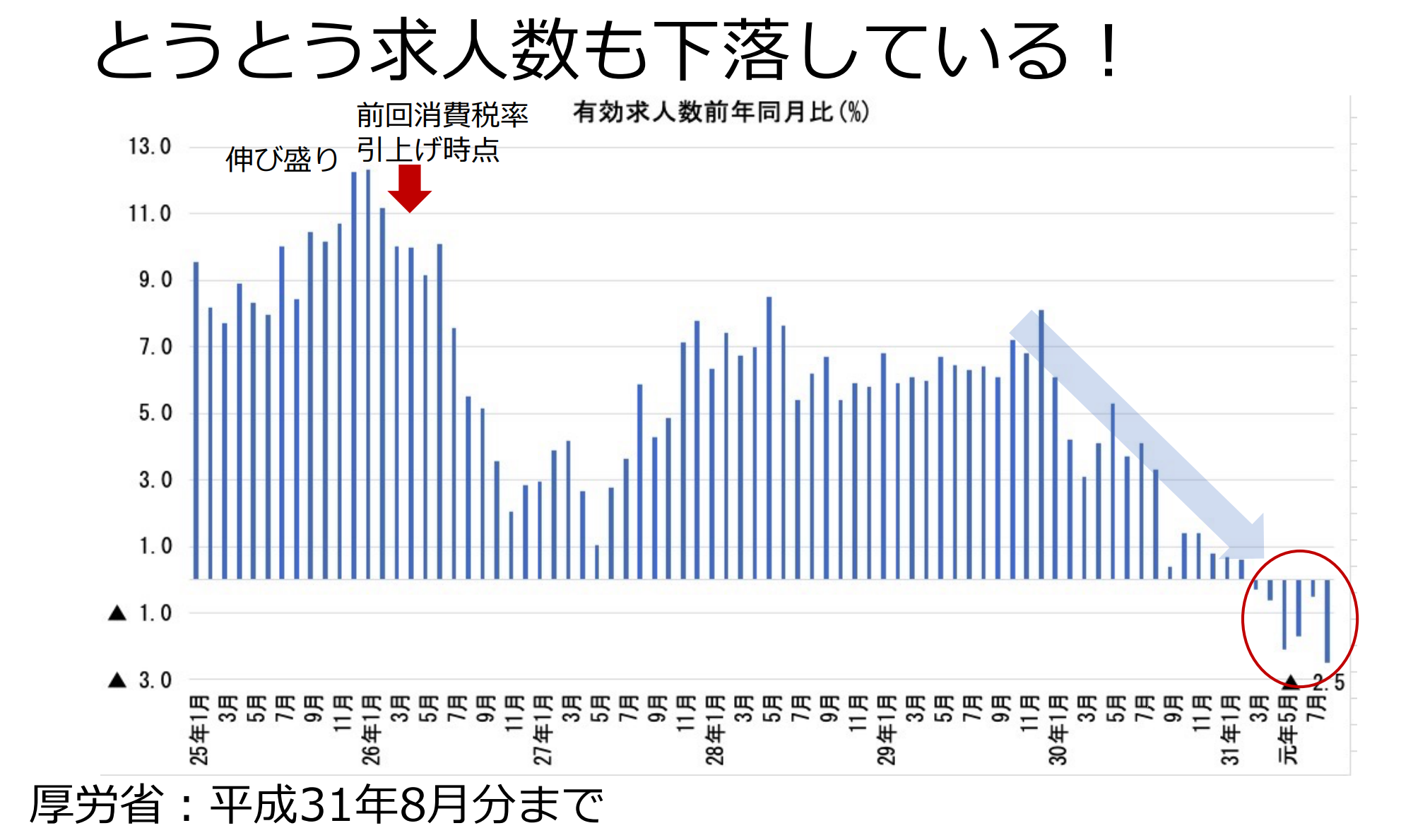「政府のアピールには要注意」
2019年11月14日 薔薇マークキャンペーン事務局コメント
概要
11月8日、安倍首相は、閣議で3年ぶりに経済対策策定を指示しました。これは、表面的には「反緊縮」の世論の高まりを意識した政府支出拡大のように見えるかもしれません。
しかし、これらの政策は当たり前に実行しなければいけないものです。それをわざわざ政府がアピールするということは、社会保障の縮小や消費税の増税といった人々を苦しめる基本方針は何も変わらない、ということを示すものです。
私たちは、この基本方針を転換させるため、これからも反緊縮をうったえていきます。
安倍首相の経済対策について
まず、この「経済対策」とは、次の施策が柱とされ、財政支出は5兆円程度とされています。
①10月の台風19号などの災害を受けた堤防等インフラの整備
②世界経済の下振れリスクへの備え
③来年夏の東京五輪・パラリンピック後の経済成長を底上げする施策
どうして安倍政権が今、この経済対策を打ち出したかというと、10月の消費増税のタイミングが景気後退期入りの中だったのが次々明らかになっていることや、10月の台風被害で100か所以上の堤防が決壊し多数の死者を出してしまったこと、それらに対する政府の対応のお粗末さが問題になっていて、それをごまかすために、「政権延命策」に乗り出さざるを得なくなったからです。
また、日本でも登場した反緊縮運動(薔薇マークキャンペーン)、れいわ新選組の台頭、保守側の令和ピボットの動き、海外のMMTの論客の来日(ケルトン教授、ミッチェル教授)など、国内外で反緊縮の経済政策が評価を得てきていることを、政権が明確に意識したものと言えます。
では、安倍政権が緊縮策を終わらせたのかというと、そうではありません。まず、政府支出の金額が5兆円では、これまで政府がやってきた場当たり的な対策と大して変わらず、人々のくらしを良くするためには、全く足りません。そしてなにより、社会保障を拡大するための政府支出こそ、今一番やるべきことなのに、安倍政権は逆のことをやっています。その閣議と同じ日に、全世代型社会保障検討会議(議長・安倍首相)が開かれ、そこでは、高齢者の医療費や介護保険の自己負担を2倍に増やすという、極端な緊縮策を取りまとめしようとしています。
今回の「経済対策」のアピールは、社会保障の縮小や消費増税という、人々のくらしにダメージを与える緊縮政策を隠すための、ごまかしです。
プログレッシブな反緊縮派は、どうするべきでしょうか。
まずは、政権のごまかしを、数字を用いたり、わかりやすい方法で可視化することが大事です。そして、ごまかしの政権には絶対できない「本当の反緊縮」経済政策を打ち出すことが必要です。例えば、社会保障をずっと手厚くすることや、消費税減税や、より規模の大きい災害対策、失業をなくし所得を向上させる取り組みなどです。そして、このような政策がどの国でも取られるように、幅広い人々との国際連帯をめざすことが必要です。
みなさん、一緒にがんばりましょう。(以上)
参考資料
松尾匡作成、2019年11月更新の景気動向グラフ(以下PDF6ページ目から13ページ目)
https://rosemark.jp/wp-content/uploads/2019/11/2019NovKurasitoKyoudouV2.pdf
あなたのお力を貸してください
薔薇マークに賛同する→賛同フォームへ
薔薇マークに寄付する→寄付の方法ページへ
英語版は以下(English version is below)
Caution needed for the Japanese Government Appeals
Comments from the Rose Mark Campaign Japan on Nov 14, 2019
Summary
On November 8th, 2019, Prime Minister Abe gave orders at the Cabinet meeting for the first economic stimulus package since 2016, as reported (e.g. https://www.google.co.jp/amp/s/amp.ft.com/content/8ee711dc-01e5-11ea-b7bc-f3fa4e77dd47 ).
On the surface, this looks as if the government finally decided to increase public spending in response to the growing public voice that demands “anti-austerity” economic policies. However, we the Rose Mark Campaign Japan believe that the government need to spend its money for the people without any special reasons. Hence, for the government to intentionally appeal its plan to increase government expenditure indeed reveals that this administration has no will to change its basic policies that immensely hurt the people’s lives, which we have already seen from social security program cut and consumption tax hike. We will continue to demand the above mentioned people-hurting policies imposed by the current administration to change, and to claim for anti-austerity economic policies for the people.
Prime Minister Abe’s Economic Stimulus Package
The economic stimulus package instructed by Prime Minister Abe is said to be about five trillion Japanese yen public spending, and have the following three main measures:
1. Reconstruction of infrastructure damaged by natural disasters including Typhoon Hagibis last October,
2. Economic safeguard measure for global economy slowdown, and
3. Economic program to enhance the nation’s economic level after Tokyo Olympic and Paralympic next summer.
The reason why the Abe administration ordered for the economic stimulus package at this point is because of the following reasons. Firstly, it became clear and obvious that the recent consumption tax hike was introduced in the midst of the nation’s economic downturn. Secondly, the typhoons last October destroyed more than 100 river embankments and even took the numbers of people’s lives. Lastly, the government responses to above mentioned issues were slow and inadequate. Consequently, it became unavoidable for Prime Minister Abe to somehow stimulate the nation’s economy so as to cover up his administration’s mistakes, hoping to prolong his Liberal Democratic Party’s administration.
The Abe administration is well aware that anti-austerity economic policies have gained more and more support in and outside Japan. For instance, in Japan, we the Rose Mark Campaign Japan have led the anti-austerity movement, a new anti-austerity progressive political party “Reiwa Shinsengumi” is newly established, and a conservative group “Reiwa Pivot” is also supportive of this anti-austerity movement. In addition, leading MMT economists such as Professor Stephanie Kelton of Stony Brook University and Professor Bill Mitchell of Newcastle University have visited Japan very recently.
Does this mean that the Abe administration decided to end its austerity policy? Our answer is NO. The amount of proposed additional government spending is five trillion yen, but this is quite similar to any ad-hoc measures that the administration has always taken, meaning that the amount is too little to improve the people’s lives. Moreover, the first and most important economic policy that our government needs to implement right now is to spend government money to expand social security programs. But the Abe administration has done the exact opposite. On the same day as the aforementioned Cabinet meeting, the Council on Social Security Reform for All Generations (the Chairman: Prime Minister Abe ) was held; this council aims to double elderly health and nursing care fees so as to impose an extreme austerity policy on us.
Therefore, the “economic stimulus package” proposed by the Abe administration is just a political deception; it is there to hide its austerity policy from the people.
What should we the anti-austerity progressives do now? First of all, it is important for us to visualize how deceptive these policies are by showing graphs, statistics, and numbers. Also, we need to propose “genuine anti-austerity economic policies” so that this type of political deception by the government won’t work any more. Examples of our proposed anti-austerity policies are: expansion of social security programs, reduction of consumption tax, implementation of large scale disaster countermeasures, and full-employment and income increase programs. We all need to work together hand-in-hand with the vast range of people internationally to make these anti-austerity policies implemented in any counties and regions all over the world.
Let us work with you all. It is time to unite! (END)
English translation by Chie Kobayashi (Twitter: @chietherabbit )


